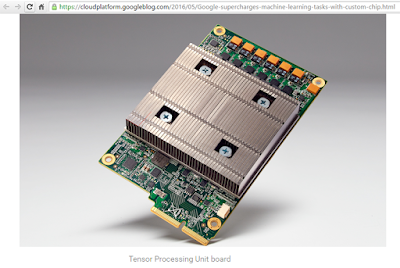Google has developed a custom ASIC for machine learning and artificial intelligence.
 The Tensor Processing Unit (TPU) is tailored for TensorFlow, which is an open source software library for machine learning that was developed at Google.
The Tensor Processing Unit (TPU) is tailored for TensorFlow, which is an open source software library for machine learning that was developed at Google.
In a blog posting, Norm Jouppi, Distinguished Hardware Engineer at Google, discloses that the TPUs have already been in deployment in Google data centers for over a year, where they "deliver an order of magnitude better-optimized performance per watt for machine learning." The stealthy project to develop in-house silicon has been underway for several years.
 A number of Google applications are already running on the Tensor Processing Units, including RankBrain, Street View, and the AlphaGo application that recently defeated the Go world champion, Lee Sedol.
A number of Google applications are already running on the Tensor Processing Units, including RankBrain, Street View, and the AlphaGo application that recently defeated the Go world champion, Lee Sedol.
Google plans to deliver machine learning as a service on its Google Cloud Platform by providing APIs for computer vision, speech, human language translation, etc.
https://cloudplatform.googleblog.com/2016/05/Google-supercharges-machine-learning-tasks-with-custom-chip.html
 The Tensor Processing Unit (TPU) is tailored for TensorFlow, which is an open source software library for machine learning that was developed at Google.
The Tensor Processing Unit (TPU) is tailored for TensorFlow, which is an open source software library for machine learning that was developed at Google.In a blog posting, Norm Jouppi, Distinguished Hardware Engineer at Google, discloses that the TPUs have already been in deployment in Google data centers for over a year, where they "deliver an order of magnitude better-optimized performance per watt for machine learning." The stealthy project to develop in-house silicon has been underway for several years.
 A number of Google applications are already running on the Tensor Processing Units, including RankBrain, Street View, and the AlphaGo application that recently defeated the Go world champion, Lee Sedol.
A number of Google applications are already running on the Tensor Processing Units, including RankBrain, Street View, and the AlphaGo application that recently defeated the Go world champion, Lee Sedol.Google plans to deliver machine learning as a service on its Google Cloud Platform by providing APIs for computer vision, speech, human language translation, etc.
https://cloudplatform.googleblog.com/2016/05/Google-supercharges-machine-learning-tasks-with-custom-chip.html
- TensorFlow was originally developed by the Google Brain team and released under the Apache 2.0 open source license in November 2015. At the time, Google said TensorFlow can run on multiple CPUs and GPUs.















